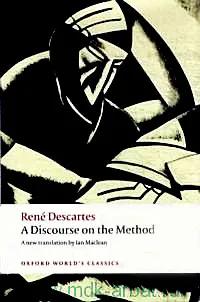A Discourse on the Method
Автор: Rene Descartes
2008
Переводчик: Maclean Ian
Переплёт: Мягкая обложка, 160 страниц
ISBN: 9780199540075
📘 "I concluded that I was a substance whose whole essence or nature resides only in thinking, and which, in order to exist, has no need of place and is not dependent on any material thing".
Descartes's A Discourse on the Method of Correctly Conducting One's Reason and Seeking Truth in the Sciences marks a watershed in European thought; in it, the author provides an informal intellectual autobiography in the vernacular for a non-specialist readership, sweeps away all previous philosophical traditions, and sets out in brief his radical new philosophy, which begins with a proof of the existence of the self (the famous "cogito ergo sum"), next deduces from it the existence and nature of God, and ends by offering a radical new account of the physical world and of human and animal nature.
This new translation is accompanied by a substantial introductory essay which draws on Descartes's correspondence to examine his motivation and the impact of his great work on his contemporaries. Detailed notes explain his philosophical terminology and ideas.
Descartes's A Discourse on the Method of Correctly Conducting One's Reason and Seeking Truth in the Sciences marks a watershed in European thought; in it, the author provides an informal intellectual autobiography in the vernacular for a non-specialist readership, sweeps away all previous philosophical traditions, and sets out in brief his radical new philosophy, which begins with a proof of the existence of the self (the famous "cogito ergo sum"), next deduces from it the existence and nature of God, and ends by offering a radical new account of the physical world and of human and animal nature.
This new translation is accompanied by a substantial introductory essay which draws on Descartes's correspondence to examine his motivation and the impact of his great work on his contemporaries. Detailed notes explain his philosophical terminology and ideas.
Мнения

